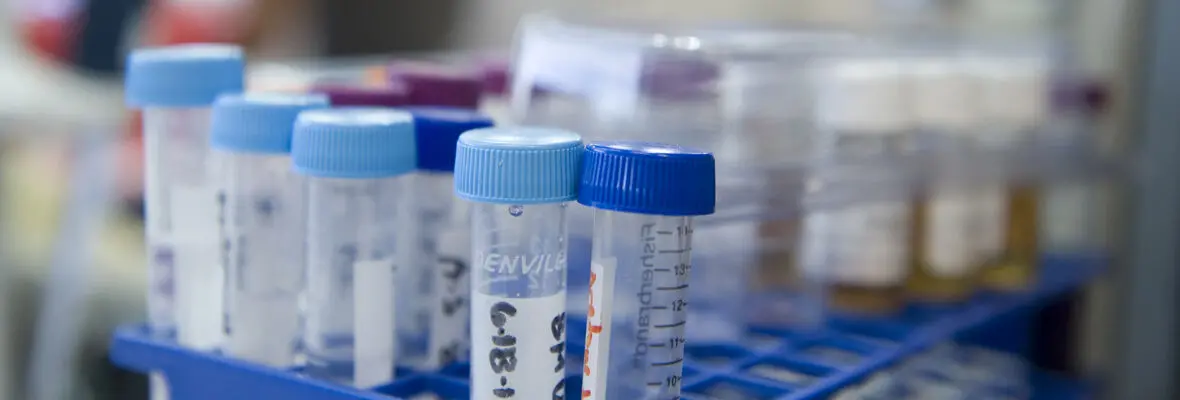Biosamples & Data Sharing
Penn's CNDR has expertise in biochemistry, drug discovery, database management and biostatistics, histology, microscopy, molecular biology and tissue culture. In addition, collaborative research opportunities to tap into our extensive collection of bio materials are available through our Biomarkers and Brain Bank programs.
CNDR experts co-lead two biomarker core programs:
ADNI – the Alzheimer's Disease NeuroImaging Initiative: This study uses imaging techniques and biomarker measures in blood and cerebrospinal fluid specially developed to track changes in the living brain. Researchers hope to identify who is at risk for Alzheimer's, track progression of the disease and devise tests to measure the effectiveness of potential interventions.
PPMI – The Michael J. Fox Foundation's Parkinson's Progression Markers Initiative: A landmark observational clinical study to comprehensively evaluate cohorts of significant interest using advanced imaging, biologic sampling and clinical and behavioral assessments to identify biomarkers of Parkinson’s disease progression.
Alzheimer’s Disease Core Center (ADCC) Biomarker Core: Led by Alice Chen-Plotkin, MD, the ADCC Biomarker Core focuses on the acquisition and sharing of biofluid samples.
The Center for Neurodegenerative Disease Research (CNDR) and University of Pennsylvania Alzheimer's Disease Core Center (ADCC) maintain tissue banks, funded by NIH (NIA, NINDS), for human brain samples obtained from patients with Alzheimer’s disease, Parkinson’s disease, and other related neurodegenerative dementias and movement disorders.
The tissue bank is a resource for qualified scientists. These tissue banks are "Core Facilities" that are part of NIH funded multi-component projects with the specific charge to support the research conducted by the project grant co-investigators. These project grant co-investigators therefore have priority for access to these samples in order to achieve the goals of their funded projects.
While CNDR and the ADCC make every effort to provide unused samples from these tissue banks to other investigators who are not part of these NIH grants, there are limitations on the types of cases acquired and banked in CNDR and the ADCC, as well as on which brain regions are available to investigators outside these NIH funded project grants. Accordingly, brain regions such as hippocampus, amygdale, brainstem, etc. – which are in high demand for use in the studies conducted by the project co-investigators in these NIH funded grants – are infrequently available to distribute to other outside investigators. Every effort is made by staff to accommodate the needs of outside investigators where possible.
There are many other sources of human brain samples for qualified researchers, including the 40+ NIH-supported brain banks in the United States, and the National Disease Research Interchange (NDRI).
To obtain biosamples, investigators must have an active IRB approval for their studies involving human tissues. This IRB approval must accompany the request form below, which must be completed and signed by the requesting principal investigator.
Download the Biosample Request form below:
The form can be emailed to PennCNDRbiobank@pennmedicine.upenn.edu
If you have questions or need further assistance in completing the above form to request a biosample, please contact:
Allison Ward
PennCNDRbiobank@pennmedicine.upenn.edu
215-746-8193
It is imperative that investigators conducting research on human tissues use universal precautions and be fully trained to conduct research using human biological samples that may harbor potentially infectious conditions. Any waste material should be treated as a biohazard and disposed of according to your institutional policy.
The goal of the Penn Neurodegenerative Data Sharing Committee (PNDSC) is to progressively and compliantly share the rich sources of multimodal data collected in the Penn neurodegenerative community with internal and external research groups to foster collaboration and open-science.
Contact: Corey McMillan, PhD
mcmillac@pennmedicine.upenn.edu
GAAIN unites a diverse and geographically distributed network of data partners within a federated data platform designed to foster cohort discovery, collaboration and sharing. GAAIN represents the first open access, federated Alzheimer’s disease data discovery platform of its kind. It is funded by the Alzheimer's Association and strives to further the association's goal of accelerating the development of Alzheimer's disease preventions, treatments and a cure.
CNDR is a proud partner of GAAIN.
To quickly and easily explore our data via GAAIN, visit:
GAAIN Data


